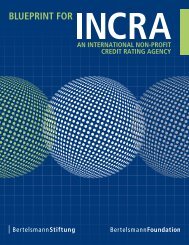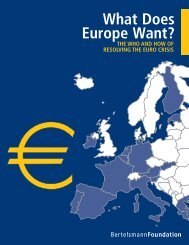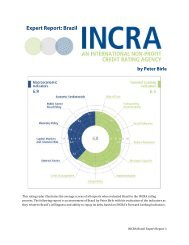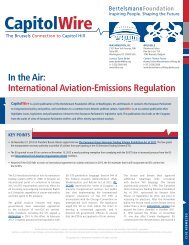BF-FieldManual-FEB13 -3.pdf - Bertelsmann Foundation
BF-FieldManual-FEB13 -3.pdf - Bertelsmann Foundation
BF-FieldManual-FEB13 -3.pdf - Bertelsmann Foundation
- No tags were found...
You also want an ePaper? Increase the reach of your titles
YUMPU automatically turns print PDFs into web optimized ePapers that Google loves.
The US should instead focus on effortsthat seek to broaden the scope ofmodernization and move cooperationaway from the political level and towardsa bottom-up, grassroots approach.It can also utilize the knowledgeand experiences gained through theEU’s ‘Partnership for Modernization’including those countries with vestedbusiness interests inside Russia. Trilateralcooperation can work towardsstrengthening Western business normsand creating a vibrant market economyin Russia. But perhaps more importantly,an improved investment climate andexpanded US economic trade with Russiacould lead to economic growth in sectorsoutside of the extractive industriesaffiliated with or controlled by theRussian government. This in turn wouldstrengthen the growing middle class ofmoderates and reformers that constitutethe most significant constituency forlong-term change in Russia.5. Expect Russia to make a “pivot”of its own to Asia:The clear message from the recentAPEC Summit in Vladivostok is thatRussia increasingly sees its futurein Asia. Moscow’s need to reduce itssusceptibility to a major economiccrisis in Europe and the growing roleof the US and China in the region willnecessitate a move eastward. TheObama administration should thereforeprepare for a Russian “pivot” of its ownto Asia that will bring challenges in theAsia/Pacific region and along the post-Soviet periphery.Since Putin’s return to office, the Russiangovernment has placed expandingeconomic ties in the region at the top ofits agenda. A major priority at the APECSummit was touting the developmentof the Eurasian Customs Union, whichPutin declared would “play an active partin shaping the regional and internationalagenda”. 24 The union, based largelyon the EU model, creates a commoncustoms market for three states (Russia,Kazakhstan and Belarus) with hopes ofeventually bringing most of the formerSoviet Union into the fold.The ECU will be especially importantas Russia increasingly faces stiffcompetition in the Central Asia region.The EU’s pursuit of the so-calledSouthern Gas Corridor has turned its gazeincreasingly towards Central Asia, whilethe US and NATO continue to maintainan active interest in the region thanksto operations in Afghanistan. China isalso taking a more active interest in theregion. Central Asia currently supplies10 percent of China’s energy needs, andtrade with the five Central Asian statestotaled $23 billion in 2010. 25 Navigatingrelations with Beijing is tricky. On onehand, China has replaced Germany asRussia’s top bilateral trade partner,totaling $80 billion in 2011, and Russiais eager to build the infrastructurenecessary to export its hydrocarbonseastward. 26 Yet both countries areincreasingly in competition forresources and influence in CentralAsia. Russia’s economic struggles haveweakened its influence in Central Asia,and the financing of oil and gas fieldsand infrastructure in Turkmenistan,Kazakhstan and Uzbekistan threatensto upset Moscow’s dominance of theregion’s energy transport network andreduce Russian leverage. 276. Forge a common trans-Atlanticposition on Europe’s periphery:Both the US and European states willwant to continue bilateral engagementswith Russia, but the Obamaadministration should also stronglyconsider pursuing a common trans-Atlantic position on Europe’s easternperiphery, particularly with countriessuch as Ukraine and Georgia. The EUhas pushed its Eastern Partnershiptowards these states and other countrieson the European periphery with theaim of acculturating them to EU normsand standards.But Europe’s efforts to integrateUkraine and Georgia have been slowand uncoordinated, as EU memberstates are split between those seekinginclusion in Euro-Atlantic institutionsand those reluctant to do so due toissues such as visa liberalization or fearof harming relations with Russia. WhileUkraine has professed that its destinylies in Europe, its weak institutions,widespread corruption, and PresidentViktor Yanukovych’s more pro-Russianforeign policy has make it difficult tomeet EU standards. Georgia’s prospectshave likewise dimmed considerablyfollowing the 2008 war with Russia. Thelonger the Association Agreement andDeep and Comprehensive Free TradeAgreement (DCFTA) negotiations dragon, the more difficult it may be for thesegovernments (particularly Ukraine’s) tobuild the political support necessaryto ratify them. And apprehension insome European capitals, particularlyBerlin, has stalled Georgia’s efforts tojoin NATO.The stalling of negotiations presentsan opportunity for Russia and the ECU,into which Moscow has campaignedheavily for Ukraine’s inclusion. While aDCFTA with Europe would force Ukraineto adopt EU rules without having a sayin them, the ECU would offer Ukrainefull membership rights and allow it tomaintain access to the Russian market. 28Georgia has maintained a strident pro-West attitude, but it also has a sizabletrade relationship with Russia. Theother factor is that while the ECU is sofar relatively weak, further developmentcould see it end the EU’s role as the“only game in town”. Therefore, the USand Europe must together to find acommon position on the region thatmaintains the attractiveness of Euro-Atlantic institutions and pushes fordemocratic reforms.Russia6 9






